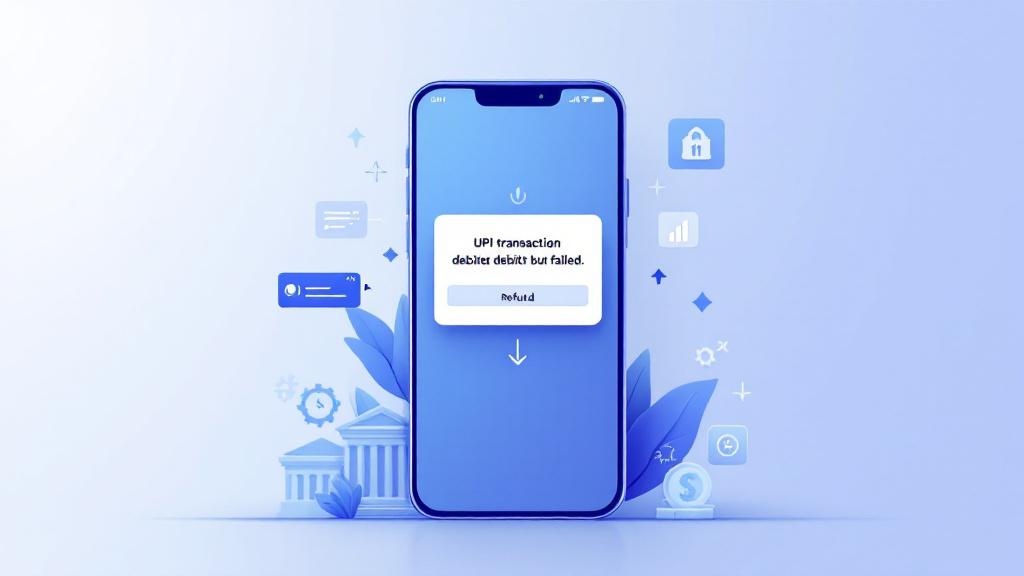In today’s digital world, UPI (Unified Payments Interface) has become a popular and trusted mode for real-time money transfers. With its ease of use, speed, and security features, it’s no wonder that millions of transactions occur daily. However, even with its reliability, there are times when things don’t go as planned. A UPI transaction may fail, but the amount might still get debited from your account. This situation can be frustrating, but there’s no need to panic. In this article, we’ll walk you through the UPI failed refund process, explain the steps you can take to get your money back, and clarify common concerns surrounding UPI refunds.
What Happens When a UPI Transaction Fails but the Amount is Debited?
When you make a UPI payment, the system processes it in real-time. But occasionally, issues like server failures, network problems, or payment gateway issues may lead to the transaction being marked as “failed,” even though the amount has already been deducted from your account. In such cases, you may wonder: What happens next?
Here’s the good news: UPI transactions are designed to be secure, and there is a clear process in place for refunds. You won’t lose your money. However, retrieving your funds might take some time. The UPI refund process involves multiple stages, and knowing how it works will help you deal with the situation more effectively.
Understanding the UPI Refund Process
When a UPI transaction fails but the amount is debited, the refund process typically begins automatically. The refund is credited back to your account in most cases. However, the time taken for this depends on various factors such as the banks involved, the nature of the failure, and the specific policies of the payment system.
Key Steps in the UPI Failed Refund Process
-
Transaction Failed but Amount Debited:
-
First, you need to verify that the transaction was indeed unsuccessful (check for an error message, confirmation, or notification). Sometimes, the transaction fails at the merchant’s end, or there may be an issue with the payment gateway.
-
-
Automatic Refund:
-
In most cases, once the transaction fails, the system automatically initiates a refund. According to the NPCI UPI refund rules, the amount is usually credited back within a few hours to a couple of days.
-
-
Bank Reversal Timeline:
-
Depending on the type of failure and the bank’s internal processes, the bank reversal timeline may vary. Some banks process refunds within 24 hours, while others may take longer. It is also essential to check whether the failure occurred within the same bank or across different banks, as the interbank transfer process can take longer.
-
-
Customer Care Involvement:
-
If the refund is not processed within the stipulated time frame, you should contact UPI refund customer care at the bank or UPI service provider. They can provide you with the transaction reference ID and other details needed for further resolution.
-
UPI Refund Process Time
The time taken to process the refund can vary based on several factors:
-
Immediate Refunds: If the failure occurs within the same bank or the payment gateway is the issue, the refund might be processed quickly (typically within 1-3 hours).
-
Cross-Bank Transfers: If the transaction was an interbank transfer, it could take up to 5-7 working days for the refund to reflect in your account.
-
Payment Gateway Issues: In case of an issue with the payment gateway (e.g., the merchant’s side), the refund could take a few days longer. You can always raise a complaint with the merchant or UPI complaints portal.
What to Do if You Haven’t Received Your Refund Yet?
If a few days have passed, and the amount still hasn’t been credited back to your account, follow these steps:
-
Check Transaction Details:
-
Verify the transaction by checking the transaction reference ID. This ID will help both you and the bank track the transaction in question.
-
-
Contact Your Bank:
-
If you’ve not received the refund within the expected time frame, contact your bank’s customer service. Use the UPI refund escalation process to raise the issue if the standard procedure does not resolve the issue.
-
-
Raise a Complaint:
-
If the refund still doesn’t happen after contacting customer care, consider filing a failed UPI transaction complaint through your bank’s official complaints portal.
-
-
Seek Assistance via NPCI:
-
If your issue is still unresolved, you can escalate the matter to the National Payments Corporation of India (NPCI), which oversees the UPI system. They can help in resolving transaction disputes and ensuring adherence to the RBI refund regulations.
-
UPI Refund Policy – What You Need to Know
The UPI refund policy ensures that the money deducted due to a failed transaction is returned to the customer. However, there are some important guidelines:
-
Timing: UPI refunds are typically processed within a few working days. If there’s a significant delay, it could be due to bank-related issues or technical delays.
-
Dispute Resolution: UPI provides an efficient system for transaction dispute resolution, which is a process that helps resolve issues between the customer and the merchant or between two banks.
-
RBI Guidelines: According to RBI refund regulations, the customer is entitled to receive the amount within a reasonable period if the transaction fails. Banks are obligated to ensure the refund process is smooth.
-
Bank-Specific Policies: Each bank may have slightly different policies and timelines regarding refunds. It’s a good idea to be aware of your bank’s specific rules.
How to Prevent UPI Transaction Failures
Although transaction failures can happen due to reasons beyond your control, here are some tips to minimize the likelihood of issues:
-
Check Your Bank Account Balance: Ensure that you have sufficient funds in your account to make the payment.
-
Verify Payment Details: Double-check the recipient’s details before confirming the transaction. Even a small mistake can cause a payment failure.
-
Ensure Network Stability: A stable internet connection is crucial for UPI payments to go through smoothly.
-
Update Your UPI App: Regularly update your UPI app to avoid bugs or glitches that might interfere with transactions.
-
Avoid Peak Hours: Sometimes, UPI systems can become overloaded during peak hours, leading to delays and failures. If possible, avoid making transactions during these times.
FAQs About UPI Refund Process
1. How do I get a refund for a failed UPI transaction?
-
If your UPI transaction fails, the refund process is usually automatic. If the refund is not received, you can contact customer care with the transaction reference ID.
2. How long does it take for a UPI refund to reflect in my account?
-
Typically, a refund can take between 1-7 working days, depending on the nature of the failure and the bank’s processing time.
3. What should I do if I haven’t received a refund for a failed UPI transaction?
-
First, contact your bank’s customer care service. If the issue persists, file a complaint using the UPI complaints portal.
4. What are the NPCI UPI refund rules?
-
NPCI mandates that refunds must be processed within a reasonable timeframe. The guidelines ensure that both customers and banks follow a set process for dispute resolution.
5. Can I file a complaint if my UPI transaction failed but the money was debited?
-
Yes, you can file a failed UPI transaction complaint with your bank or escalate the issue to the NPCI if the problem persists.
6. What is the UPI refund escalation process?
-
If the refund isn’t processed within the expected time frame, you can escalate the issue by filing a formal complaint with the bank or using the UPI complaints portal.
7. What is the role of the RBI in UPI refunds?
-
The RBI ensures that customers are not left stranded with failed transactions. Their guidelines outline the procedures for banks to follow when processing refunds.
Conclusion
A UPI failed refund process may seem confusing at first, but understanding the steps involved can help you navigate it with confidence. Whether it’s checking the transaction reference ID, contacting customer care, or filing a formal complaint, there are ways to ensure you get your money back. Remember that UPI refunds are governed by specific NPCI guidelines and RBI refund regulations, so your money will most likely be refunded within a reasonable period.








Comments (0)